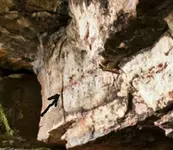Roy,
You are correct about the Jesuits hiding the church treasures when they felt they were in danger. Herbert Eugene Bolton wrote:
"At Dolores Father Kino, Lieutenant Manje, and three citizens of Bacanuche awaited the onslaught. An Indian who had been stationed on the mountains, seeing the smoke at San Ignacio, fled to Dolores with the news that Father Campos and all the soldiers had been killed. Manje sped to Opodepe to get aid; the three citizens hurried home to Bacanuche, and Kino was left alone. When Manje returned next day, together they hid the treasures of the church in a cave, but in spite of the soldier's entreaties that they should flee, Kino insisted on returning to the mission to await death, which they did. It is indicative of the modesty of this great soul that in his autobiography this incident in his life is passed over in complete silence. But Manje, who was weak or wise enough to wish to flee, was also generous and brave enough to record the padre's heroism and his own fears."
You may notice that only Kino and Manje hid the church treasures. Not exactly a horde of gold bullion.
You have a good memory.
Take care,
Joe
Hmm just exactly how much could two men hide in a cave, in an unexplained amount of time? Lets say they only had a day to get it done. How much could two men, that certainly had access to such things as ox carts, wagons, mules, burros and horses, move to a cave to conceal it? I think you may be underestimating just what "horde" is being referred to here. Also remember that Kino himself wrote about shipping a load of silver bullion to Rome, which unfortunately somehow vanished before it ever reached there. If memory serves, that amounted so some 800 ounces? Would you turn your nose up at 800 ounces of silver? The point being made was that we have recorded instances of Jesuits hiding 'church' treasures
inside of caves. If a treasure hunter wishes to find a lost Jesuit treasure then, the logical starting point would be to search for caves known to those Jesuits, would it not?
Thanks for the compliment, but although some of these details do stick in memory, I can not remember what I ate yesterday!

Backwoodsbob wrote
You say that only them two hid the churches treasure. What makes you so sure of that? There are many places still out there.
You are reading something I never wrote -
I did NOT say that they ONLY hid two church treasures in two caves. There could be as many more as there were missions and visitas! The whole point was that if anyone wishes to search for a Jesuit treasure,
the logical place to start looking is caves that may have been known to the Jesuits of each location. It is not going to be easy either, for the caves would logically be sealed up too. Please don't misunderstand what I was saying - not that ONLY two church treasures were ever hidden in caves, just that
we have two RECORDED cases of this happening.
We might also add the San Xavier del Bac treasure, which included the massive silver altar service, and MAY be hidden in a cave or old mine. In fact this treasure may be hidden inside the La Esmeralda mine, which also remains un-discovered today. The evidence points to the Indians themselves being responsible for hiding this rather impressive treasure, estimated in the early 1800s to be worth at least $40,000 in silver - probably twenty times that today. Also, there is one documented case where the Jesuits hid a small gold treasure in the walls of a mission in Baja California, which is unique and the only such instance I know of, so it is almost certainly a waste of time to destroy old mission ruins thinking some treasure is hidden inside the walls. The padres were far from stupid, they knew that the missions were probably the worst possible place to hide any treasures.
It is only logical that the padres (and I would include the Franciscans, Dominicans etc) would make use of existing tunnels and caves to hide treasures, especially if only known to "their" Indians, rather than having to dig a big hole in a hurry. Also, it would make it that much easier to retrieve said treasures when the danger(s) had passed.










 Keller's letter is among the documents in the Mission2000 database, if memory serves. Both incidents occurred during revolts of the Pimas.
Keller's letter is among the documents in the Mission2000 database, if memory serves. Both incidents occurred during revolts of the Pimas. 
